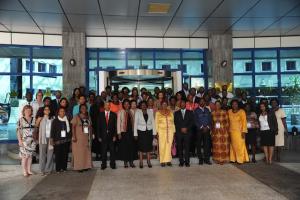East African experts deliberate on gender based violence
Entebbe, 18th June 2014:- In Uganda, 62% of Gender Based Violence (GBV) is by intimate partners and largely affects women between the ages of 15 to 49. The Uganda Health and Demographic Survey (UDHS) of 2011 showed that 63% of the women in Uganda had experienced physical or sexual violence or both in their lives.
GVB acts such as battering, rape, defilement, sexual harassment, Female Genital Mutilation, forced marriages; widow inheritance and verbal abuse among others are too prevalent and lead to serious health consequences especially for women and girls.
The situation is almost the same globally. According the World Health Organization (WHO), 35% of women in the world and 45% in Africa have experienced GBV in their lifetime.
These findings are the basis of an inter country workshop currently going on in Entebbe, Uganda, that has brought together policy makers and practitioners from Ethiopia, Eritrea, Kenya , Rwanda, South Sudan, Tanzania, and, Uganda to try and address intimate partner violence and sexual violence against women as a public health problem.
Although Uganda has ratified and is implementing a number of national and international gender based laws, the abuse of women and girls still continues. Almost on a daily basis, there are media reports on domestic violence in the country predisposing mainly women and girls to injuries, unwanted pregnancies, sexually transmitted diseases, unsafe abortions and in some instances death.
Therefore, in Uganda and in many of the countries represented at the meeting, GBV is not only a public health problem but also human rights issue. For Uganda, this recognition has led to the passage of three significant legislations namely; The Prevention of Trafficking in Persons Act of 2009, The Domestic Violence Act of 2010, and The Prohibition of Female Genital Mutilation Act of 2010.
While the GBV situation is still unacceptably high in Uganda, there are a number of measures being taken and successes attained as highlighted by Hon Sarah Opendi the Minister of State for Health (Primary Health Care) who opened the meeting. She particularly pointed out the excellent collaboration between the Ministry of Health, the Ministry of Gender, Police and the judicially that led to the amendment of Police Form 3 enabling other cadres of health workers such as clinical officers and midwives to examine and give expert evidence in GBV court cases.
In addition, Hon Opendi reported that, in Uganda today, all the public health promotion programs contain messages that relate to prevention of Gender Based Violence noting that “we have fostered Gender based violence prevention including building capacity of health workers in providing needed health services to all survivors of Gender Based Violence with compassion and confidentiality”.
The Minister of Gender, Labour and Social Development (Gender and Culture) Hon Rukia Nakadama who was also at the opening ceremony reiterated the success. “ A comparison of UDHS findings of 2006 and 2011 shows a decrease in incidence of physical violence which has dropped slightly against women aged 15 to 49 from 34% in 2006 to 27% in 2011. Sexual violence cases against women also decreased from 39% in 2006 to 28% in the same period”, she said.
However, men are not entirely free of GBV as there are increasing cases that have been reported. The media has highlighted several cases of women battering and mutilating men and some are not reported due to fear of stigmatization. Overall, women and girls are the victims of the majority of GBV.
At the meeting, WHO, UNFPA and other partners that are supporting the government roll out GBV services throughout the country were represented and dully acknowledged. The WHO Country Representative in Uganda Dr Wondimagegnehu Alemu who spoke on behalf of the UN agencies pledged more support and collaboration emphasizing to the participants the need to explore practical public health approaches to prevent GBV.
Dr Alemu gave the example of some unfortunate cultures and traditions that regard some acts of GBV as normal and an expression of love. “I hope you will develop practical and concrete actions for moving forward in addressing violence against women within your respective areas of work and responsibility in your countries” he said.
For Uganda, the meeting comes at a time when the country is preparing the second National Development Plan. It is hoped that the outcomes of this meeting will feed into this important development framework especially regarding understanding and addressing the risk factors for GBV.
__________________________________________________
For more information please contact:
Benjamin Sensasi, Health Promotion Adviser
WHO Country Office
Tel 256-414-335500
Email: sensasib [at] who.int (sensasib[at]who[dot]int)



